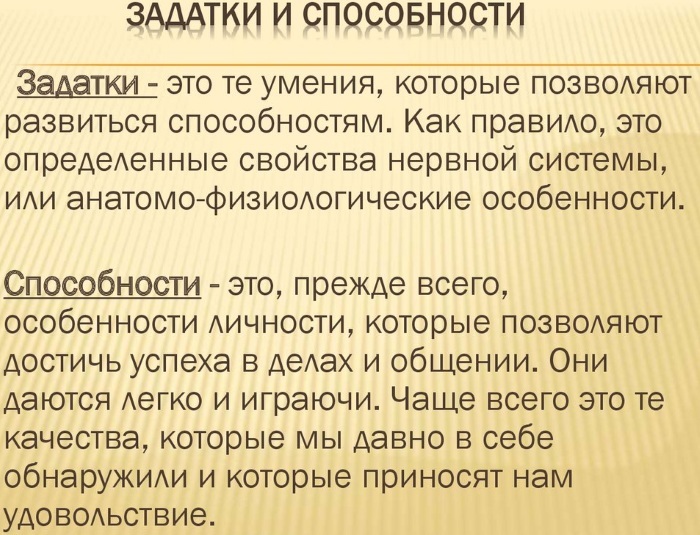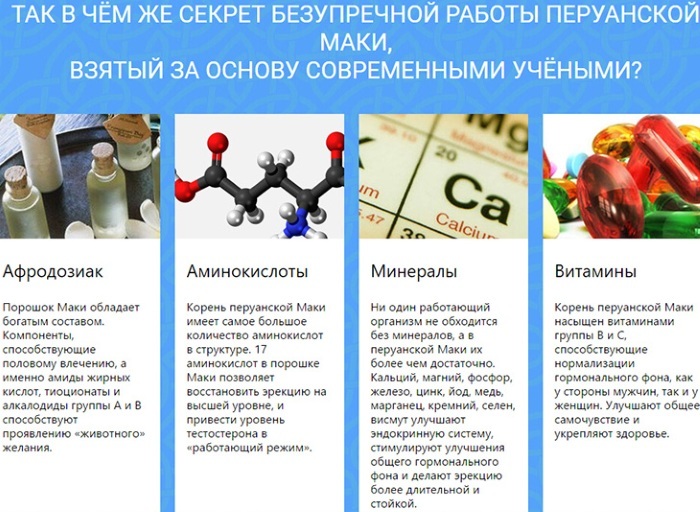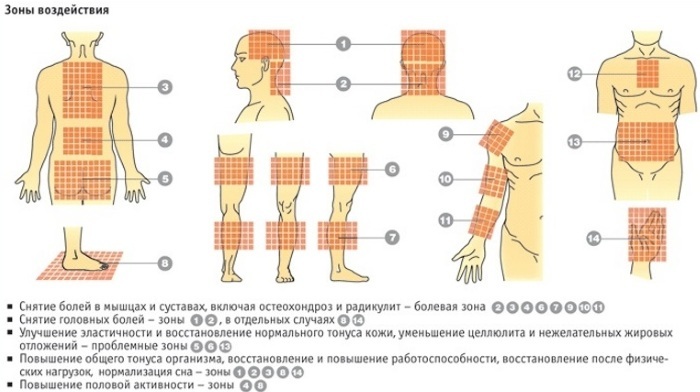Content
- What are Thyroglobulin Antibodies?
- The rate of antibodies to thyroglobulin in women, men by age
- What test determines the level of Anti-TG?
- Diseases in which a blood test for antibodies to thyroglobulin is prescribed
- Rheumatoid arthritis
- Diabetes mellitus (type 1 and 2)
- Myasthenia gravis
- Autoimmune thyroiditis
- Diffuse toxic goiter
- Subacute thyroiditis
- Hypothyroidism
- Nodular goiter
- Sjogren's Syndrome
- Systemic lupus erythematosus
- Contraindications and limitations to the study
- Preparation for blood donation, sampling and timing of the analysis
- Causes of elevated anti-TG levels
- What are the dangerous high titers of antibodies?
- Correction and therapy of the level of antibodies to thyroglobulin
- Food
- Drugs
- Anti TG video
Anti TG is a type of immunoglobulin, which suppress the production of thyroglobulin and provoke the development of diseases. In some cases, hormones can act as tumor markers.
What are Thyroglobulin Antibodies?
The thyroid gland produces a huge amount of thyroid hormones, including specific hormones that can lead to various disorders in the body.
One of these hormones is anti-TG. Their products may be associated with various autoimmune disorders. Under normal conditions, antibodies do not cause the development of any disease and can be produced in small quantities.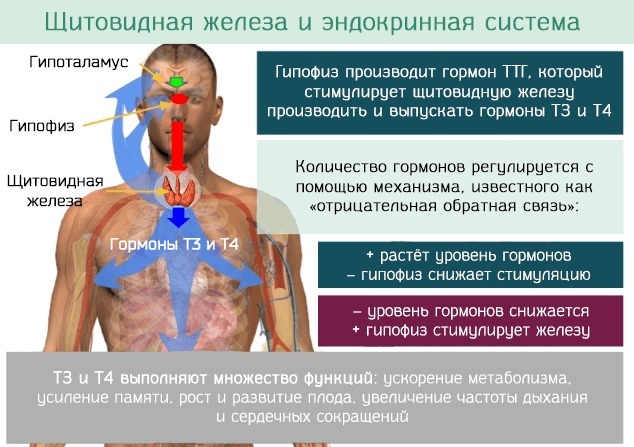
However, in case of failures in the endocrine or immune system, their production increases significantly, which leads to suppression of thyroglobulin and, as a result, causes inflammatory reactions in the thyroid gland. In this case, anti-TG can also lead to a violation of the synthesis of other thyroid hormones.
The rate of antibodies to thyroglobulin in women, men by age
There are certain norms when the concentration of antibodies in the blood is not a violation and is not capable of leading to pathological processes in the thyroid gland.
The level of specific hormones depends on the age and sex of the person and is indicated in U / ml or IU / ml (Invitro).
| Childhood | Rate (IU / ml) |
| Newborns (up to 1 week) | 10 to 134 |
| 1 month to 7 years | 11,8-38 |
| Adolescence (under 18) | 13,4-64 |
In men, these indicators persist throughout life and rarely change. The norm is from 40 to 50 ng / ml. At higher rates, the risks of developing pathologies increase significantly.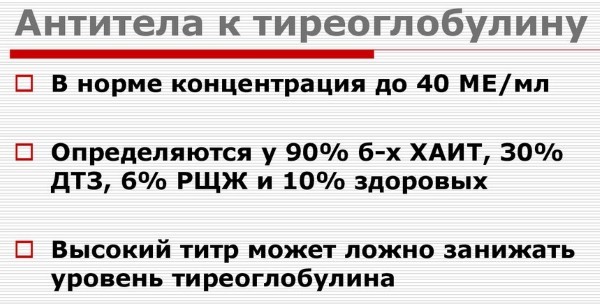
In women, AT TG can fluctuate depending on age and other physiological characteristics. Thus, antibody levels may rise during pregnancy. Also, its concentration can increase with hormonal changes, menstruation. The norm is from 40 to 50 ng / ml.
What test determines the level of Anti-TG?
Anti-TG is a hormone, the level of which can be determined using modern diagnostic methods. First of all, if a pathology is suspected, a general blood test is prescribed for the level of thyroglobulin. In case of underestimated or increased indicators, a specific analysis is carried out for AT TG. For the analysis, it is necessary to donate blood from a vein. The obtained biological material is sent to the laboratory for further study.
Diseases in which a blood test for antibodies to thyroglobulin is prescribed
There are many different diseases for which anti-TG testing is prescribed. At the same time, some of them, at first glance. May be completely unrelated to thyroid dysfunction.
Rheumatoid arthritis
Pathology is associated with immunity and is characterized by the development of inflammation in the connective tissue and joints. In this case, the disease can occur in various parts of the body, symmetrically affecting the articular system. The risk group is people over 35 years old. As a rule, with disease, the concentration of antibodies to TG increases.
Diabetes mellitus (type 1 and 2)
According to studies, the production of antibodies to TG is observed in 30% of patients with diabetes mellitus, since the disease is associated with the work of the thyroid gland and the production of hormones.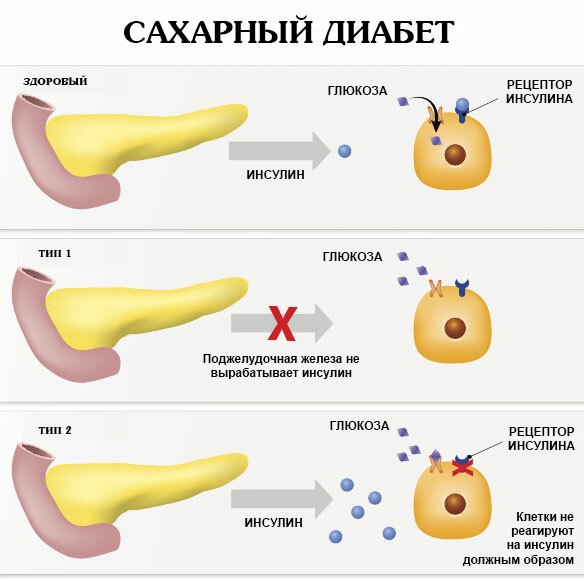
The risks of developing increased production of anti-TG increase almost 1.5 times in patients with type 2 diabetes mellitus.
Myasthenia gravis
The disease is a specific autoimmune disorder characterized by interruptions in the transmission of nerve impulses. Pathology ultimately leads to weakness and fatigue of the muscular muscles. Anti-TG can affect various parts and organs in which muscle tissue is located. Most often it develops in the area of the eye muscles, which leads to the development of ocular myasthenia gravis.
Autoimmune thyroiditis
With the development of this disease, damage (inflammation) of the thyroid gland occurs. The process is caused by damage to the follicles and follicular cells of the organ and often occurs against the background of increased production of antibodies to thyroglobulin.
If a pathology is suspected, an immunogram is additionally prescribed.
Diffuse toxic goiter
The disease is also called Basedow's disease or Perry's syndrome. It occurs against the background of damage to the thyroid gland, which begins to increase the production of various hormones (hyperfunction).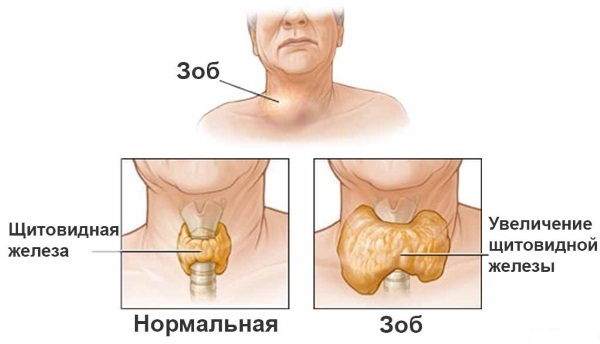
Pathology manifests itself with various defects in the functioning of the immune system, which causes the production of a large amount of TSH antibodies, which leads to increased work of the thyroid gland.
Subacute thyroiditis
Anti-TG is a hormone, an increase in the level of which can lead to the development of thyroiditis. Pathology most often occurs in people from 30 to 60 years old. With its development, inflammatory reactions occur in the region of the thyroid gland. This symptomatology is caused by various infectious and viral agents.
Hypothyroidism
This disorder leads to hyperfunction of the thyroid gland, which, in turn, provokes an increased amount of hormones produced, including antibodies to TG.
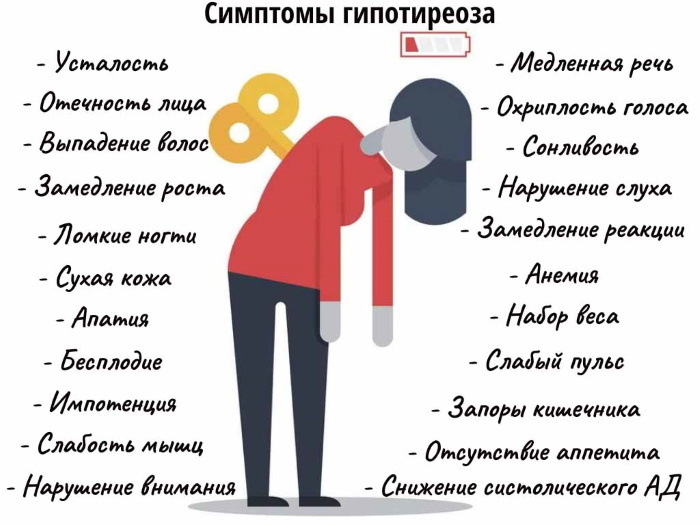
The condition occurs against the background of any autoimmune disorders.
Nodular goiter
Nodular goiter is a disease in which the development of nodular joints occurs, which have a different etiology (nature of origin). A characteristic sign of pathology is the protrusion of the goiter. The causes of the disease are not fully understood, however, iodine deficiency in the body and somatic mutations are considered among the most common theories. Violation can be determined visually or by ultrasound.
Sjogren's Syndrome
With the development of this pathology, connective tissue damage occurs, caused by autoimmune disorders. In this case, the disease can manifest itself in different ways. Sjogren's syndrome is one of the most common diseases. Caused by an increase in the production of antibodies to thyroglobulin.
Systemic lupus erythematosus
This disease is a chronic process that occurs against the background of damage to the immune system. The disease has characteristic skin manifestations.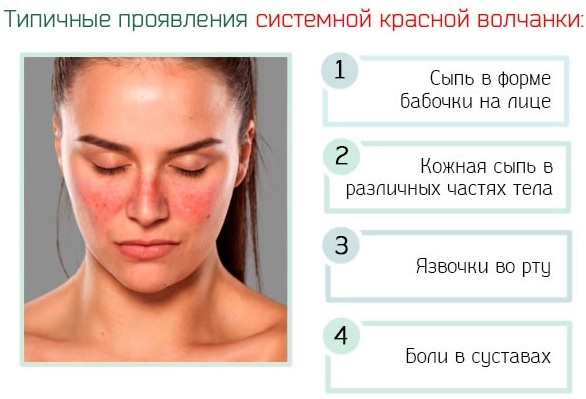 Its pathogenesis is associated with the production of antibodies to healthy cells (thyroglobulin).
Its pathogenesis is associated with the production of antibodies to healthy cells (thyroglobulin).
Contraindications and limitations to the study
Hormone testing for anti-TG should be performed only in the absence of any restrictions, since there are risks of displaying incorrect data (false-positive result).
Contraindications:
- intolerance to the procedure;
- taking medications, especially drugs that affect the production of hormones (hormone replacement therapy);
- recent medical procedures - physiotherapy, massage, various diagnostic studies (ultrasound, MRI, CT. ECG).
If necessary, in case of non-transportability of the patient, blood sampling can be done at home.
Preparation for blood donation, sampling and timing of the analysis
Before passing the study, it is necessary to prepare in advance so that the data obtained during the analysis are correct and reliable.
Preparation rules:
- It is recommended to take the test before the first half of the day (11.00), since this time is the peak time for the production of hormones.
- Before the examination on the day of the procedure, you should refuse food. It is allowed to drink plain water.
- In a few hours it is necessary to give up nicotine, cigarettes, including electronic ones.
- For 2-3 days, you should give up alcohol and any alcohol-containing drinks.
- One day before the start of the diagnosis, it is necessary to exclude any physical or stressful stress.
- For a few days, you should stop taking medications, especially those affecting the thyroid gland. In this case, you must first consult with your doctor.
For half an hour or an hour before the analysis, the patient is recommended to relax, the diagnosis should be carried out in a calm and quiet environment.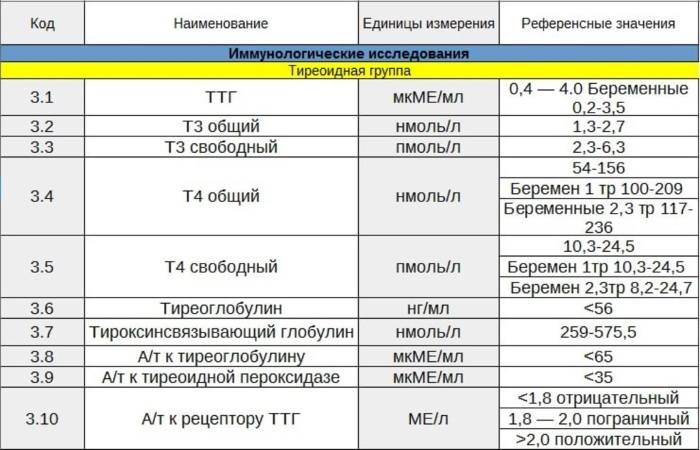
Research results will usually be available in a few days. Based on the data obtained, the specialist will prescribe an appropriate set of treatment measures.
Causes of elevated anti-TG levels
There are many provoking factors by which there is an increase in the production of antibodies to TG.
Causes:
- diseases of internal organs, especially pathologies associated with the work of the thyroid gland;
- malignant course of anemia;
- the transferred surgical interventions;
- trauma and damage to the thyroid gland;
- genetic disorders (hereditary predisposition);
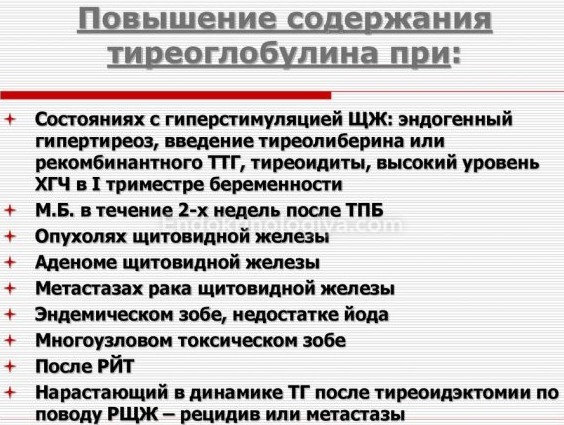 In more rare cases, an increase in the concentration of anti-TG may occur against the background of a biopsy. This factor depends on the individual characteristics of the patient's body, and therefore, it is not observed in everyone.
In more rare cases, an increase in the concentration of anti-TG may occur against the background of a biopsy. This factor depends on the individual characteristics of the patient's body, and therefore, it is not observed in everyone.
What are the dangerous high titers of antibodies?
Anti-TG is a hormone that should be monitored periodically as it can lead to additional disorders. If treatment is delayed or completely absent, the patient may develop health and life-threatening consequences.
Possible complications:
- somatic disorders;
- depressive conditions;
- asthma attacks, shortness of breath;
- sleep disorders (insomnia);
- weight loss;
- heart failure;
- angina pectoris, atrial fibrillation;
- tremor of the limbs.
In more severe cases, a toxic form of hepatosis (intoxication and impaired liver function) or hypothyroid coma may develop.
In the presence of malignant neoplasms, the disease can be fatal.
Correction and therapy of the level of antibodies to thyroglobulin
To reduce the level of antibodies to thyroglobulin, it is necessary to carry out complex therapy, which includes taking medications and correcting nutrition. In more complex cases, surgical intervention is prescribed. Most of the operative actions are used in the presence of neoplasms, including malignant ones. Also, according to the recommendations of the attending physician, various physical procedures can be prescribed. However, they are used extremely rarely, since their effectiveness is not high.
Food
In case of pathology, it is recommended to adhere to a healthy lifestyle, including following the rules of nutrition.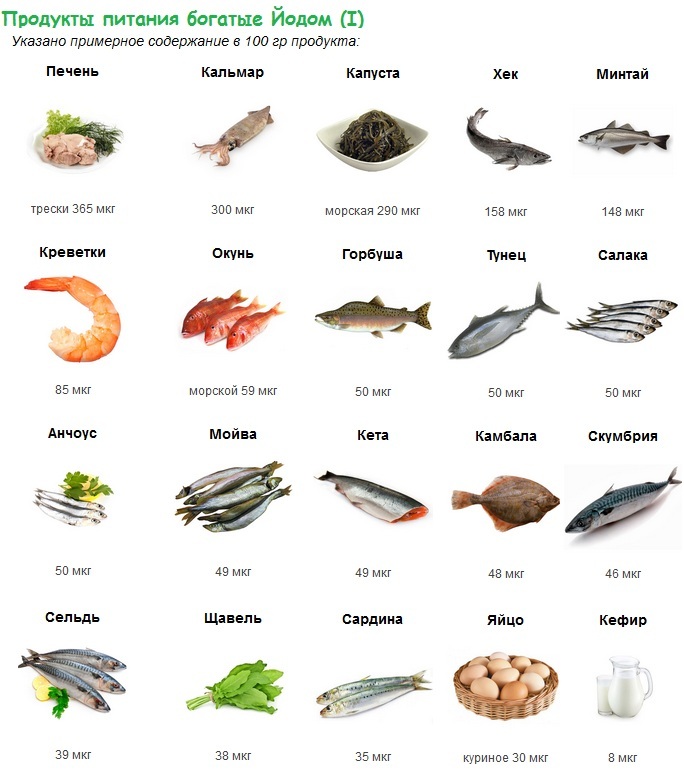
What is allowed to use:
- low-fat types of fish - herring, salmon, herring;
- various seafood;
- seaweed;
- bone-based broths;
- hard cheeses;
- fresh vegetables and fruits;
- low-fat cottage cheese;
- goat milk and other products made from it;
- flax seeds;
- Coconut oil.
It is necessary to refuse and completely exclude the following foods from the diet:
- meat products;
- eggs;
- pastries and sweets;
- products containing soy;
- carbonated and sweet drinks;
- rye, barley and wheat;
- salt and sugar;
- refined products;
- cabbage, radishes, turnips.
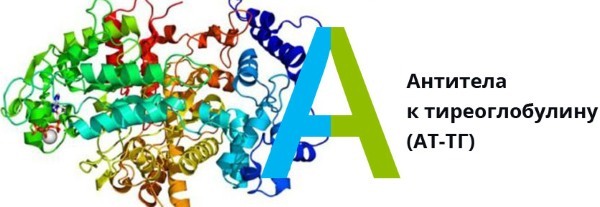
Antibodies to thyroglobulin
In this case, it is also necessary to observe the drinking regime. It is recommended to consume at least 3 liters of liquid per day.
Drugs
Anti-TG is a hormone that can be controlled with a variety of medications. Medical therapy is selected by the attending physician individually according to the established diagnosis.
Groups of funds:
- NSAIDs (non-steroidal anti-inflammatory drugs) - Almiral, Indomethacin.
- Hormonal agents - Levothyroxine, Eutirox.
- Drugs that reduce the production of T3 and T4 - Metizol, Tyrozol.
Instructions for the use of drugs:
- Almiral. This remedy is made on the basis of diclofenac (active ingredient) and has anti-inflammatory, antipyretic and analgesic effects. The medicine is used for inflammatory and degenerative pathologies of bones and articular tissue, as well as an anesthetic. It is indicated for adults and children from 6 years old. Dosage regimen: 25 to 50 mg 2-3 times a day. Also, during the first 5 days, a solution can be used, after which they switch to a tablet form. The duration of therapy is according to the testimony of a doctor.
- Indomethacin. This medication has anti-inflammatory and analgesic effects. It has an extensive list of indications, including various disorders caused by an increase in anti-TG production. Dosage regimen: inside, 25 mg from 2 to 3 times a day. The maximum duration of treatment is no more than 4 weeks.
-
Levothyroxine. This remedy contains thyroid and parathyroid hormones and is used as a substitute therapy for various disorders of organ functions, as well as in the presence of diseases caused by malfunctions of the thyroid glands. Dosing regimen: inside, 25-300 mcg / day (maximum dosage for malignant tumors). Duration of treatment as recommended by a doctor.
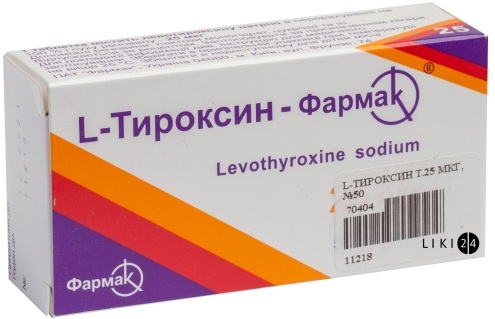
- Eutirox. This medication belongs to the group of thyroid drugs and is prescribed as a substitute treatment, because it contains hormones produced by the thyroid and parathyroid glands. The medicine is used for various diseases of the thyroid gland, as well as for conditions caused by improper functioning of the organ. The drug can be used in newborns. Scheme of use: from 25 to 300 mcg / day. The duration of the course is according to the recommendations of the attending physician.
- Metizol. This drug belongs to the group of antithyroid drugs. Recommendations for use: thyrotoxicosis, preparation for some diagnostic procedures, thyrotoxic crisis, treatment with radioactive iodine. The medication has no age restrictions. Dosages: for children - 0.5-0.7 mg / kg of the child's body weight 3 times a day; adult patients are prescribed 15-60 mg 1 to 3 times a day. The duration of the drug use is determined by the attending physician based on the patient's condition.
- Tyrosol. This drug belongs to the group of antithyroid drugs. It is used for thyrotoxicosis and conditions associated with increased production of hormones. The medicine can also be used in preparation for surgical interventions and as a treatment with radioactive iodine. Age restrictions - at least 3 years old. Scheme of use: from 20 to 40 mg 2-3 times a day, based on the area of application. The duration of treatment can vary and in some cases reaches 2 months.
As additional funds, various vitamin complexes can be prescribed.
It is not recommended to use and take drugs on your own, as this can lead to a worsening of the patient's condition and cause additional complications.
An increase in anti-TG can occur for various reasons indicating the presence of internal diseases, therefore it is recommended to systematically undergo blood tests for hormones. Since a timely detected disease significantly increases the chances of a full recovery and helps prevent the development of severe consequences.
Anti TG video
Why thyroglobulin and antibodies to TG are determined:

